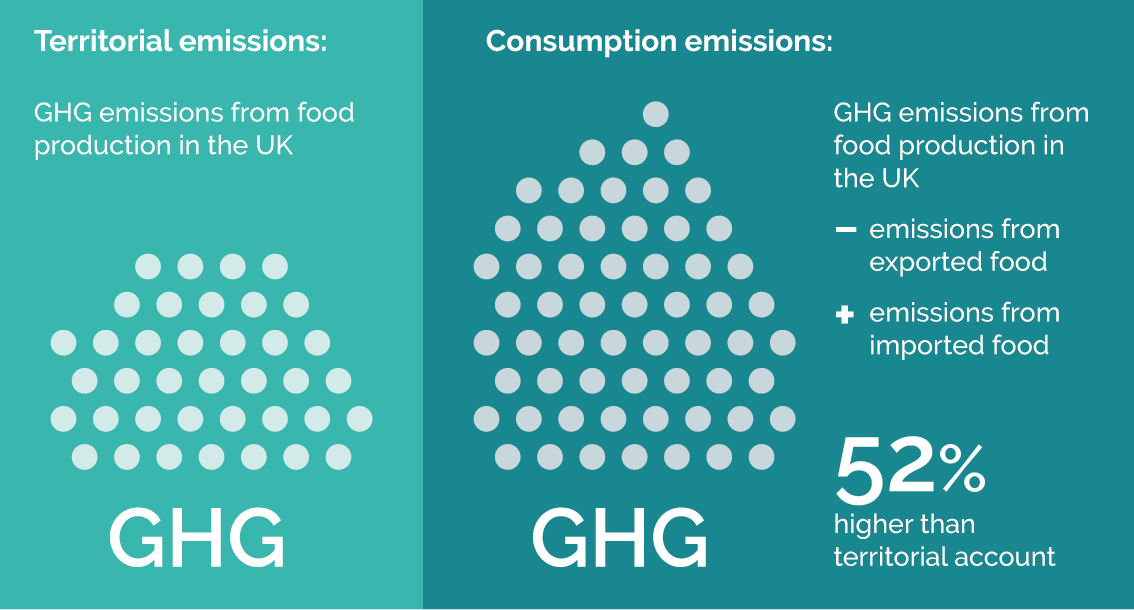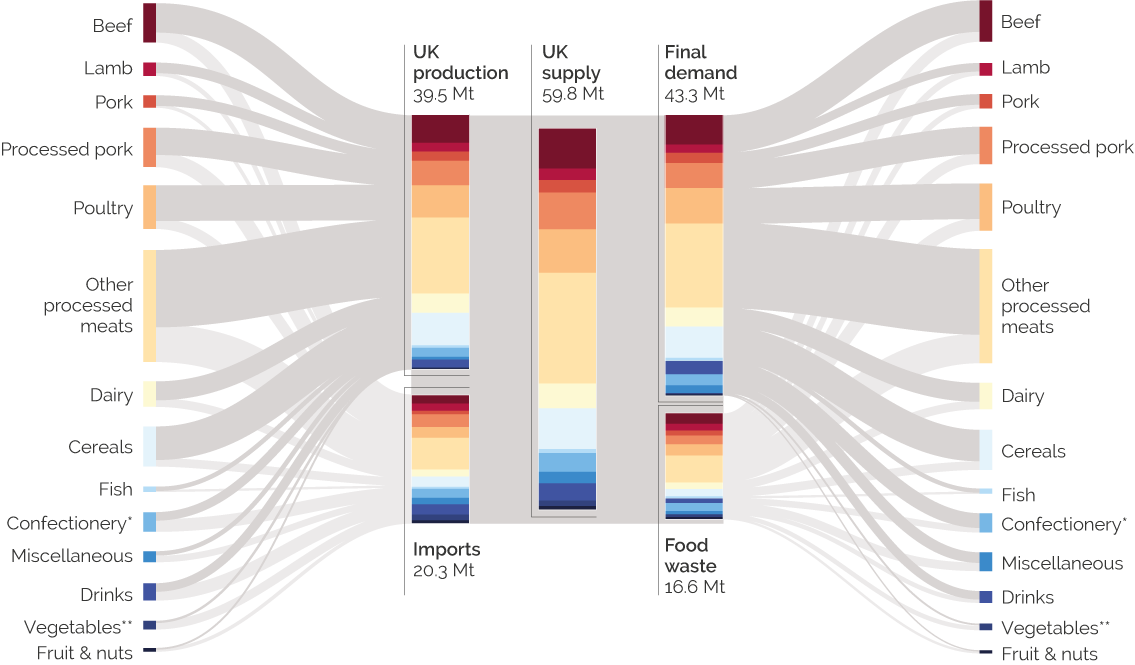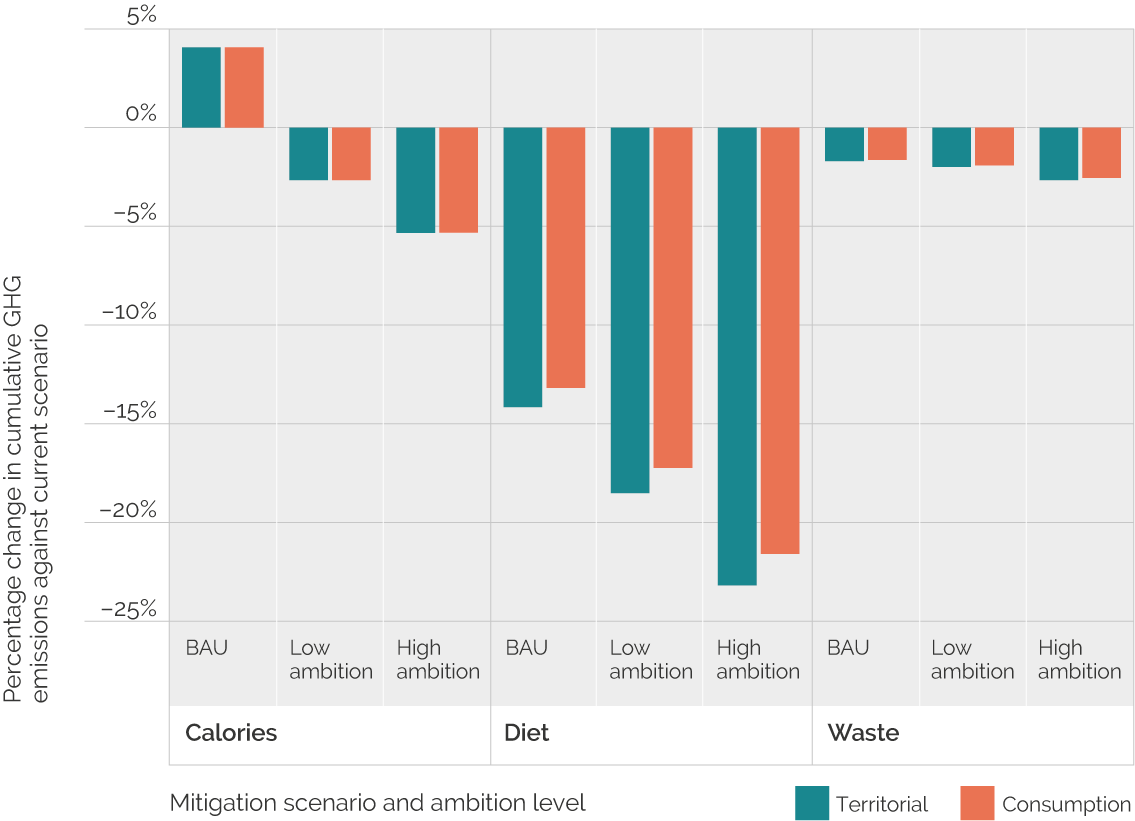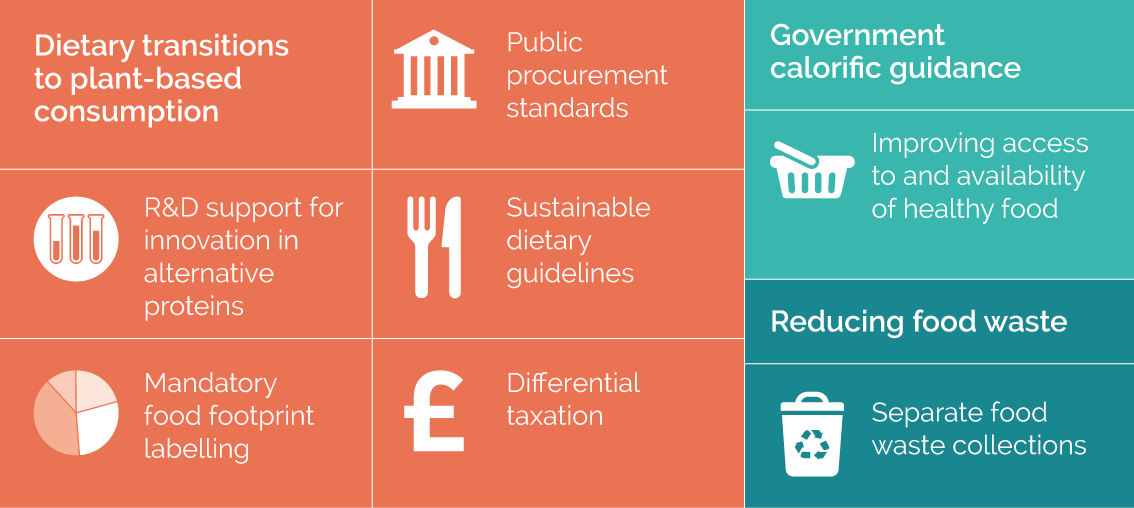
Reducing the UK’s food footprint: Demand-side action for more palatable food emissions
Reading time: 15 minutes
Key findings
- Our demand for food drives greenhouse gas (GHG) emissions throughout the food supply chain including from agriculture, food processing and transportation. In the UK this demand is projected to grow towards 2050 as a function of high current levels of demand and population growth.
- Agriculture and land use accounts for 11% of the UK’s territorial GHG emissions. Our research shows that imported food adds 20 MtCO2e to the UK’s food footprint: equivalent to around half the emissions from domestic production. Thus, action to reduce demand in UK food-related emissions would have an impact at a global scale.

Image description
Territorial emissions consist of GHG emissions from food production in the UK. Consumption emissions consist of GHG emissions from food production in the UK, minus emissions from exported food plus emissions from imported food – a total that is 52% higher than the territorial account.
- We show that transformative demand-side scenarios could reduce the UK’s absolute annual territorial GHG emissions from the food system by 52% (2017–2050), and consumption emissions by as much as 49%.
- We evaluate the potential of transitions to more plant-based diets, following UK government guidance on calorific intake, and reducing food waste.
- Sustainable dietary change carries benefits for personal as well as planetary health, and there is a current culture of acceptability around low-carbon diets. However, there are also a number of structural issues affecting the UK food system, including food poverty and carbon leakage, which require careful and equitable policy design.
- Whilst mitigation of food system emissions depends on changing consumption, this is not the sole responsibility of the consumer – therefore we outline a number of policy options towards sustainable dietary change.
Transforming the UK’s food footprint

Image description
Sankey diagram shows consumption-based emissions for sectors of the food industry. Processed meats other than pork account for the largest proportion of emissions, followed by beef, poultry and processed pork. Sectors that account for the lowest emissions are fruit and nuts, fish, and vegetables.
The agriculture and land use sector represents 11% of the UK’s territorial GHG emissions, and is expected to be a growth sector by 2050 (Climate Change Committee, 2018). Substantial impacts from food demand are also seen in the manufacturing and transport sectors. Global GHG emissions from food production are expected to increase by 50-90% without mitigation, driven by population and income growth worldwide (Willett et al., 2019).
Mitigation of food-related emissions in the UK will be a critical action to achieve legislated carbon budgets aligned with net-zero. The UK’s consumption-based food emissions are 52% greater than its territorial account, meaning action in this area is important in terms of taking global responsibility.
The territorial and consumption-based impact is driven by final demand for food; changing the composition and level of this final demand will be an important action to reach net-zero consistent food emissions in the UK. Demand-side change has important benefits in addressing consumption-based emissions by improving resource efficiency and changing both the quantity and structure of demand for imported goods (Owen et al., 2018). Figure 2 outlines the consumption-based emissions flows constituting UK final food demand, highlighting the role of imported products in the UK’s food-related emissions.
We assessed the mitigation potential of three dietary change options using a hybrid physical input-output food system model, namely: dietary transitions towards plant-based consumption, following government dietary recommendations on calorific intake, and reducing food waste (Garvey et al., 2021). The analysis revealed that transformative demand-side scenarios of the UK food system could reduce absolute annual territorial GHG emissions by 52% (2017–2050), with dietary transitions being the single most effective measure, achieving reductions of 22–44% (see Figure 3).

Table details
| Mitigation scenario | Ambition level | Territorial | Consumption |
|---|---|---|---|
| Calories | BAU | 4% | 4% |
| Low ambition | -3% | -3% | |
| High ambition | -5% | -5% | |
| Diet | BAU | -14% | -13% |
| Low ambition | -19% | -17% | |
| High ambition | -23% | -22% | |
| Waste | BAU | -2% | -2% |
| Low ambition | -2% | -2% | |
| High ambition | -3% | -3% |
Promoting dietary change through policy
The recent publication of the National Food Strategy, an independent review into the UK food system, put forward a number of recommendations to improve the health and environmental standards of UK diets (National Food Strategy, 2021). But little policy response has been forthcoming, and responsibility for UK food policy is distributed between 16 government departments, complicating action (Parsons, 2020).
Dietary change is often viewed as problematic to encourage via policy, given the perception of dietary choice as a fundamental human right. Recent attitudes and trends favouring low-carbon diets suggest a level of acceptability around policy interventions, however there are questions of both the longevity of interest in following vegan diets for instance (i.e. whether it is a dietary ‘fad’) and the reliability of data on these recent trends. The BAU scenario (as in Figure 2), assumes that such trends towards plant-based consumption continue towards 2050.
Demand-side action on consumption should not be assumed as the sole responsibility of consumers.”
Acceptability will depend on the type of policy action. There is no precedent for moderating calorific intake levels by design (apart from through rationing in exceptional wartime conditions), though there are a number of strategies in place to address obesity. Discussion of changing existing diets also becomes problematic from a social justice perspective given the UK population’s dietary needs are not being universally met, with food bank use up 74% against 2016 levels (Crew, 2021). Ultra-processed, high calorie foods are generally cheaper (Vandevijvere et al., 2020), and often lower carbon, but with little nutritional value. For instance one study found that some of the lowest emissions values were ‘associated with foods of low nutritional value, including sweets’ (Drewnowski et al., 2015). The problem is therefore in achieving an affordable and nutritious low carbon diet. Any food policy will need to take into account regressive distributional effects, as is much debated in the context of meat taxation. However, many options to reduce the emissions intensity of UK diets carry co-benefits for personal as well as planetary health. There could also be cost savings for consumers; Springmann et al. (2021) show that a healthy and sustainable balanced diet could cost up to a third less in countries like the UK compared to current diets.
Existing policies disproportionately focus on either the food production system or food waste. For instance, in a COP26 pledge of 45 countries the UK Government committed to invest in sustainable farming (Defra and BEIS, 2021). By contrast, policies on the consumption side are more limited. Reducing food waste has been a relatively uncontroversial option, given its characterisation as a ‘moral scandal’, therefore policy in this area is reasonably well developed (HM Government, 2018). Other recent policy has circulated around the role of packaging waste, despite the fact this tends to account for only 7% of the climate impact of food (Garnett, 2011). There is also a trade-off between having enough packaging to preserve food, whilst avoiding excess material waste. A whole food systems policy approach is required to ensure policy is concentrated on the most effective areas of action.
A number of actions beyond traditional policy instruments are also available and can involve the application of new technologies. Several apps make use of Life Cycle Assessment data to allow consumers to undertake personal carbon tracking; for instance, ‘Evocco’ tracks the carbon footprint of shopping by analysing receipt data (Evocco, 2021). Food waste apps such as Olio, Karma and Too Good To Go allow their users to buy cheap waste food from businesses or other consumers (Which?, 2021). New ‘smart bins’ which track the volume and composition of wasted food, and ‘smart fridges’ are also proposed steps to reduce food waste, particularly in commercial settings (Fleming, 2020). Blockchain technologies are also being applied to the food supply chain to trace the origins and environmental impact of imported food products (Kamilaris et al., 2019). Funding could broadly support the use of such technologies, and be directed towards organisations that carry out charitable food redistribution, for instance FareShare.
The number of prospective policy options to act on the food system (Table 1) highlight that action on final demand is not necessarily the sole responsibility of the consumer, and that consideration should be given to the availability and accessibility of different food types as part of the UK’s food ‘infrastructure’. For example, the recent EU Farm to Fork Strategy includes many of these policy options, and broadly aims to ‘improve the availability and price of sustainable food’ (European Commission, 2020).

Image description
Dietary transitions to plant-based consumption: Public procurement standards, R&D support for innovation in alternative proteins, Sustainable dietary guidelines, Differential taxation. Government calorific guidance: Improving access to and availability of healthy food. Reducing food waste: Separate food waste collections.
| Policy option | Description and caveats | Case study |
|---|---|---|
| Public procurement standards | Mandatory public procurement standards could promote alternative diets across a diverse population given the size of the UK’s public sector (Green Alliance, 2019). | Public procurement could extend to organisations such as schools – for instance January 2020 saw a trial of plant-based school dinners in 182 primary schools in Leeds, with meat-free days and more vegan options on the menu (Johnson, 2020). The Government Buying Standards for food and catering services offer some guidance on sustainable procurement, oriented around sustainable production rather than consumption (Defra, 2021). |
| R&D support for innovation in alternative proteins | A key part of incentivising reduced meat intake is in making alternative proteins attractive, or in selling ‘a compelling benefit’ (WRI, 2019). | UKRI’s £90m Transforming Food Production programme, including projects developing novel proteins for the UK market (UKRI, 2021). |
| Mandatory food footprint labelling | Carbon labelling is increasingly debated and implemented. Mandatory environmental labelling could help inform consumer decision-making and promote low-carbon diets (Poore, 2018). | Quorn’s carbon labelling (Smithers, 2020). A traffic light labelling scheme, backed by brands such as Nestle, Marks and Spencer and others, is being trialled in the UK (Iqbal, 2021). Menus at COP26 featured carbon footprint data (Baker, 2021). The UK Food Standards Agency has called for standardisation of eco-labelling approaches in the UK and worldwide (FSA, 2021). |
| Sustainable dietary guidelines | The UK’s dietary guidelines are currently based on the ‘Eatwell Guide’, an indicative balance of foods for a healthy diet (Public Health England, 2018). Dietary guidelines could include sustainability criteria, as in the approach of the ‘planetary boundaries’ diet (Willett et al., 2019). |
Sustainable dietary guidelines have been adopted in Sweden, Brazil and the Netherlands (Röös et al., 2017). |
| Differential taxation | Differential taxation of more carbon-intensive foods (e.g. meat and dairy) is one of the most contentious policies, with detractors commenting on the potential for regressive distributional impacts. Criticisms suggest that UK meat exports could simply grow if the tax were only applied to UK goods, prompting concerns over carbon leakage given the relative efficiency of UK food production. Tax strategies would also have to account for possible perverse incentives in encouraging consumption of foods which are low-carbon, but which may have low nutritional value. |
Germany, Denmark and Sweden have been considering implementing meat taxes, but there is no clear global precedent for meat taxes (Charlton, 2019). However, a government document published alongside the net-zero strategy suggested the potential of meat taxes, before it was deleted (BEIS, 2021). |
| Planning regulation to enable fair access to healthy food | Food infrastructures and environments play an important role in dietary choice, and as such planning regulation could be used in a positive way to improve access to healthier foods. Regulating the siting of fast food outlets could avoid the creation of food ‘swamps’ and ‘deserts’ (Saunders et al., 2015). |
Public Health England guidance in the UK on how Local Authorities can use planning to improve health outcomes from food environments (PHE, 2021). |
| Separate food waste collections | Food waste collections have been promoted as a means to reduce waste rates (Green Alliance, 2018). | There will be separate household food waste collections in the UK by 2023 under provisions in the Environment Bill (Defra, 2021a). |
The briefing is based on the following paper:
Garvey, A., Norman, J.B., Owen, A. and Barrett, J., 2021. Towards net zero nutrition: the contribution of demand-side change to mitigating UK food emissions. Journal of Cleaner Production, 290: 125672. doi: 10.1016/j.jclepro.2020.125672Opens in a new tab
References
Show all references
Baker, A. 2021. Counting your carbon footprint one meal at a timeOpens in a new tab. New York: TIME.
Barrett, J, Peters, G.P., Wiedmann, T, Scott, K., Lenzen, M., Roelich, K., and Le Quere, C. 2013. Consumption-based GHG emission accounting: a UK case study. Climate Policy. 13: 1-19. doi: 10.1080/14693062.2013.788858
Charlton, E. 2019. This is why Denmark, Sweden and Germany are considering a meat taxOpens in a new tab. Geneva: World Economic Forum.
Climate Change Committee, 2018. Land use: Reducing emissions and preparing for climate changeOpens in a new tab. London: Climate Change Committee.
Department for Environment, Food & Rural Affairs (Defra), and Department for Business, Energy & Industrial Strategy (BEIS). 2021. UK leads 45 governments in new pledges to protect natureOpens in a new tab. London: Crown Copyright.
Defra, 2018. Our waste, our resources: A strategy for EnglandOpens in a new tab. London: Crown Copyright.
Defra, 2021. Government Buying Standard for food and catering servicesOpens in a new tab. London: Crown Copyright.
Defra, 2021a. New plans unveiled to boost recyclingOpens in a new tab. London: Crown Copyright.
Drewnowski, A., Rehm, C.D., Martin, A., Verger, E.O., Voinnesson, M. and Imbert, P. 2015. Energy and nutrient density of foods in relation to their carbon footprint. The American Journal of Clinical Nutrition, 101(1): 184–191. doi: 10.3945/ajcn.114.092486Opens in a new tab
European Commission, 2020. Sustainable food consumptionOpens in a new tab. Brussels: European Commisson.
Evocco. 2021. Eat within planetary boundariesOpens in a new tab, smart phone app.
Fleming, S. 2020. This AI rubbish bin will help fight food waste at DavosOpens in a new tab. Geneva: World Economic Forum.
Food Standards Agency. 2021. Urgent progress needed on a unified eco-labelling system for food in the UKOpens in a new tab. London: Crown Copyright.
Garnett, T. 2009. Livestock-related greenhouse gas emissions: impacts and options for policy makers. Environmental Science and Policy, 12: 491–503. doi: 10.1016/j.envsci.2009.01.006
Garnett, T. 2011. Where are the best opportunities for reducing greenhouse gas emissions in the food system (including the food chain?). Food Policy, 36: S23-S32. doi: 10.1016/j.foodpol.2010.10.010Opens in a new tab.
Garvey, A., Norman, J.B., Owen, A. and Barrett, J. 2021. Towards net-zero nutrition: The contribution of demand-side change to mitigating UK food emissions. Journal of Cleaner Production, 290: 125672. doi: 10.1016/j.jclepro.2020.125672
Green Alliance, 2018. Less in, more out: Using resource efficiency to cut carbon and benefit the economyOpens in a new tab. London: Green Alliance.
Green Alliance, 2019. Cutting the climate impact of land useOpens in a new tab. London: Green Alliance.
Iqbal, N. 2021. Traffic-light system of ‘eco-scores’ to be piloted on British food labelsOpens in a new tab. London: The Guardian.
Johnson, K. 2020. Vegan school dinners to be served at 180 Leeds schools to help tackle climate changeOpens in a new tab. Leeds: Leeds-Live.
Kamilaris, A., Fonts, A., Prenafeta-Boldύa, F. X. 2019. The rise of blockchain technology in agriculture and food supply chains. Trends Food Science and Technology, 91: 640–652. doi: 10.1016/j.tifs.2019.07.034Opens in a new tab
Laville, S. 2021. UK meat tax and frequent-flyer levy proposals briefly published then deletedOpens in a new tab. London: The Guardian.
National Food Strategy, 2021. Chapter 16 – The RecommendationsOpens in a new tab. Independent report for HM Government.
Owen, A., Scott, K. and Barrett, J. 2018. Identifying critical supply chains and final products: An input-output approach to exploring the energy-water-food nexus. Applied Energy, 210: 632–42. doi: 10.1016/j.apenergy.2017.09.069
Parsons, K. 2020. Who makes food policy in England? A map of government actors and activitiesOpens in a new tab. Food Research Collaboration, Centre for Food Policy, City University of London.
Poore, J., 2018. We label fridges to show their environmental impact – why not food?Opens in a new tab London: The Guardian.
Public Health England, 2018. The Eatwell GuideOpens in a new tab. London: Crown Copyright.
Public Health England. 2021. Healthy weight environments: using the planning systemOpens in a new tab. London: Crown Copyright.
Röös, E., Bajželj, B., Smith, P., Patel, M., Little, D. and Garnett, T. 2017. Greedy or needy? Land use and climate impacts of food in 2050 under different livestock futures. Global Environmental Change, 47: 1–12. doi: 10.1016/j.gloenvcha.2017.09.001
Saunders, P., Saunders, A. and Middleton, J., 2015. Living in a ‘fat swamp’: exposure to multiple sources of accessible, cheap, energy-dense fast foods in a deprived community. British Journal of Nutrition, 113: 1828–34. doi: 10.1017/S0007114515001063
Smithers, R., 2020. Quorn to be first major brand to introduce carbon labellingOpens in a new tab. London: The Guardian.
Springmann, M., Clark, M.A., Rayner, M., Scarborough, P. and Webb, P. 2021. The global and regional costs of healthy and sustainable dietary patterns: a modelling study. The Lancet Planetary Health, 5(11): e797-e807. doi: 10.1016/S2542-5196(21)00251-5
UK Research and Innovation, 2021. Alternative proteins: new horizons for novel and traditional food productionOpens in a new tab. London: Crown Copyright.
Vandevijvere, S., Pedroni, C., De Ridder, K. and Castetbon, K. 2020. The cost of diets according to their caloric share of ultraprocessed and minimally processed foods in Belgium. Nutrients, 12(9): 2787. doi: 10.3390/nu12092787
Willett, W., Rockström, J., Loken, B., Springmann, M., Lang, T., Vermeulen, S., Garnett, T. et al.Food in the Anthropocene: the EAT-Lancet Commission on healthy diets from sustainable food systems. Lancet, 393 (2019): 447-492. doi: 10.1016/S0140-6736(18)31788-4Opens in a new tab
Which? 2021. Too Good To Go, Olio and Karma: Food waste apps reviewedOpens in a new tab. London: Which
World Resources Institute (WRI), 2019. Creating a sustainable food future: A menu of solutions to feed nearly 10 billion people by 2050Opens in a new tab. Washington D.C.: World Resources Institute.
Banner photo credit: NRD on Unsplash